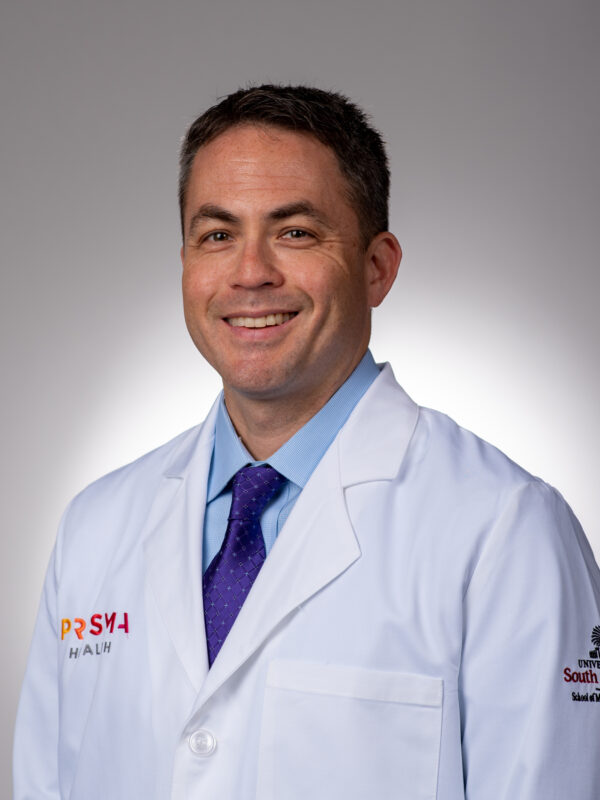When to be concerned about enlarged lymph nodes
Have you ever had a viral infection like the flu and realized you felt tender, swollen or even painful lumps beneath your jaw or near your armpit? What you likely felt was enlarged lymph nodes working with your immune system to fight off your illness.
“Lymph nodes are essentially hubs for the body’s immune response,” said Ear, Nose and Throat surgical specialist Jeffrey Jorgensen, MD. “They can enlarge due to a variety of causes, some of which are more serious than others and may need medical attention.”
Dr. Jorgensen explained the basics on what causes enlarged lymph nodes and how to know if they’re a sign that it’s time to speak to your doctor.
Where are lymph nodes located?
There are hundreds of lymph nodes located throughout the body, with a large number of them throughout the head and neck region. In fact, these lymph nodes in the neck and head are the ones you are most likely to have noticed when ill.
Lymph nodes are connected by lymphatic vessels and work by filtering and removing fluids that leak out of blood vessels. Lymph nodes produce antibodies and protective cells when they detect disease or infection, helping to prevent some illnesses and to recover from others.
What causes enlarged lymph nodes?
“There are a few different conditions that can lead to swollen lymph nodes,” said Dr. Jorgensen. “Infection is the most common, but lymph nodes can swell as a result of trauma, lymphomas or cancers as well.”
Aside from the usual cold, flu or other illnesses, other causes of enlarged lymph nodes include:
- Impacted or abscessed teeth
- Ear infections
- Inflammation of the gums (also called gingivitis)
- Mouth sores
- Sexually transmitted illness, or STI
- Tonsilitis
- Rheumatoid arthritis
- Leukemia
- Non-Hodgkin lymphoma
- Hodgkin disease
- Certain medications used to treat seizures
- Metastatic cancers
Which lymph nodes within the body swell up usually depends on where the problem the lymph nodes are responding to is located.
What are the symptoms of enlarged lymph nodes?
“Really, the main symptom is the swelling itself,” said Dr. Jorgensen. “It can be painful or tender to the touch or it may be totally painless. In some cases, the swollen lymph node feels fixed and solid, or it may be more mobile.”
How is the cause of enlarged lymph nodes diagnosed?
If the swelling is caused by a viral or bacterial infection, there will usually be other symptoms that your primary care physician can combine with the lymph node swelling to pinpoint the cause. Since the lymph nodes that respond most often to infection are in the neck, you may have your doctor press on the area around and just under your jaw or behind your ear to examine the level of swelling.
In the event of ongoing unexplained swelling or if further examination is called for, an ultrasound or CT scan might be ordered to take a closer look. When needed, a fine needle biopsy or lymph node biopsy is performed to better understand exactly what is causing lymph nodes to swell.
How are enlarged lymph nodes treated?
“When it comes to lymph nodes that are swelling due to infection or inflammation, observation is usually all that’s called for,” said Dr. Jorgensen. “Since lymph nodes tend to swell during immune responses, treating the underlying illness or having it resolve on its own will lead to a decrease in lymph node size without further action needed.”
When swelling in the lymph nodes happens because of lymphoma or cancer, needle biopsies and surgical lymph node removal and examination help your doctor know more about what next steps may need to be taken.
“Since enlarged lymph nodes can be a sign of a serious problem, they shouldn’t be discounted,” said Dr. Jorgensen. “If you have swollen, painful or tender lymph nodes that don’t resolve or don’t seem directly related to a viral or bacterial infection, schedule an appointment with your doctor to speak with them about it as soon as you can.”
Find a doctor
Whether you’re looking for a primary care physician or need to see a specialist, we’re here to help with experienced, compassionate care near you.
Find a Doctor

